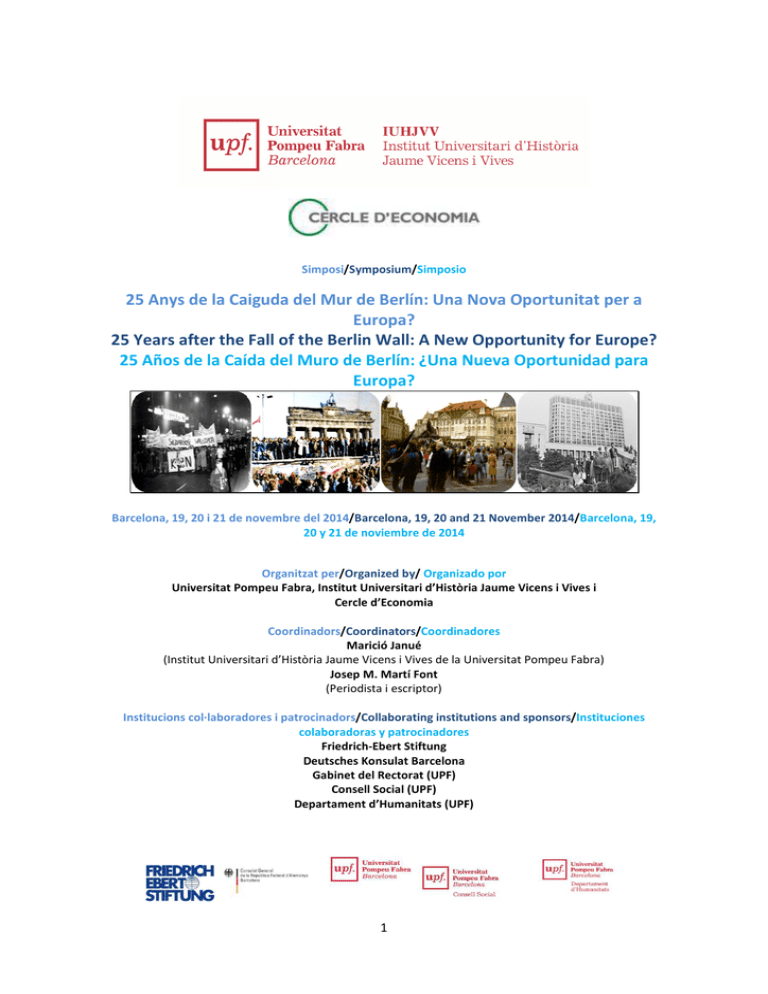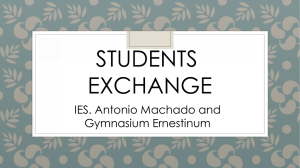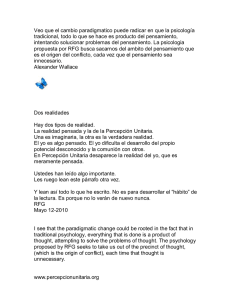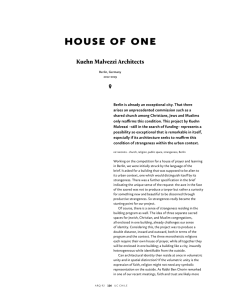Abstracts 25 anys mur - Universitat Pompeu Fabra
Anuncio

Simposi/Symposium/Simposio 25 Anys de la Caiguda del Mur de Berlín: Una Nova Oportunitat per a Europa? 25 Years after the Fall of the Berlin Wall: A New Opportunity for Europe? 25 Años de la Caída del Muro de Berlín: ¿Una Nueva Oportunidad para Europa? Barcelona, 19, 20 i 21 de novembre del 2014/Barcelona, 19, 20 and 21 November 2014/Barcelona, 19, 20 y 21 de noviembre de 2014 Organitzat per/Organized by/ Organizado por Universitat Pompeu Fabra, Institut Universitari d’Història Jaume Vicens i Vives i Cercle d’Economia Coordinadors/Coordinators/Coordinadores Marició Janué (Institut Universitari d’Història Jaume Vicens i Vives de la Universitat Pompeu Fabra) Josep M. Martí Font (Periodista i escriptor) Institucions col·laboradores i patrocinadors/Collaborating institutions and sponsors/Instituciones colaboradoras y patrocinadores Friedrich-Ebert Stiftung Deutsches Konsulat Barcelona Gabinet del Rectorat (UPF) Consell Social (UPF) Departament d’Humanitats (UPF) 1 Abstracts Sessió 1/Session 1/Sesión 1: La caiguda del mur de Berlín i el seu context. Una mirada històrica/The fall of the Berlin Wall and its context: an historical view/La caída del muro de Berlín y su contexto. Una mirada histórica • “Did Communism really collapse?” José Faraldo, professor de la Universitat Complutense de Madrid • “La Rusia de Putin. Nostalgias imperiales” Pilar Bonet, corresponsal d’El País a Moscou • “German Unification and the so called “Window of Opportunity”” Hans-Jürgen Misselwitz, del Comitè Executiu del Partit Socialdemòcrata Alemany (SPD) a Berlin Born 1950, studied Biology and Biophysics; worked at the Academy of Sciences of the GDR and at Humboldt-University of Berlin. 1981 he had to leave the university; studied Protestant Theology in East-Berlin until 1986. 1987 to 1988 postgraduate fellow of the World Council of Churches in the USA; until 1989 in a Lutheran parish in the town Hennigsdorf near Berlin. Politically active since 1981 in the oppositional Peace movement in EastBerlin.1990 Member of the free elected parliament Volkskammer of the GDR and deputy foreign minister in the de-Maiziére-Government. Head of the GDR- Delegation at the Two-plus-Four-Negotiations. 1991 to 1999 Director of the Brandenburg Center for Civic Education in Potsdam. Since 1999 he works for the Socialdemocratic Party’s (SPD) Executive Board in Berlin. He is secretary for its Basic Values Commission. The fall of the Berlin Wall 25 years ago is now widely considered as the key event that finished the Cold War. But in the place the amazing fact of open borders in Berlin confronted international politics with the nearly forgotten “German question”. To solve this question meant no less than overcoming both, German as well as European division, because they were linked together and elements of the solution in the same time. When Chancellor Kohl presented his program for “Overcoming the th Division of Germany and Europe” at November 28 , he saw German unity at the end of a process that required a “new order of peace in Europe” without mentioning NATO what President Bush immediately did: United Germany must be member of the NATO. It lasted until February 1990 that German unity was set on the international political agenda. One reason was the expected economic collapse of the GDR and doubts in a stable new democratic regime. The ongoing spontaneous reunification “on the ground” led the US – government decide to speed up the political process for another reason: the Soviet Union, one of the Allied Powers with responsibilities concerning Germany, should not come in a position to veto the NATO-option. In order to avoid this, the agenda of the Two plus Four Talks of the Four Powers and the two German states were strictly limited to solve problems of the past , not those of the future. 2 The then famous word of an historic “window of opportunity”, seen to be widely open 1989, after 1990 already closed. Instead of the once promised “new order of peace in Europe“ the existing western institutions and alliances extended to the border of the former Soviet Union. The question is: How to get the promise of 1989 alive or will there be a new Wall separating Europe from Russia? _____________________________________________________________________________________ Sessió 2/Session 2/Sesión 2: L’Europa que va néixer de la fi de la Guerra Freda/The Europe born of the end of the Cold War/La Europa que nació del fin de la Guerra Fría • “Las fronteras son (sólo) líneas sobre el mapa” Simona Skrabec, presidenta del Comitè de Drets Lingüístics i Traduccions del PEN Internacional She lives in Barcelona since 1992. She is the author of the books L’estirp de la solitud (2003) and L’atzar de la lluita (2005). With Arnau Pons she directed an extensive project about cultural exchange between Germany and Catalonia (Grenzen sind Straßen, 2007-2008, 2 vol). She has translated more than twenty books from Slovenian into Spanish and Catalan, as well the translation of most important Catalan authors (Moncada, Cabré, Ferrater, Marçal, etc.) into Slovenian. She is also a regular literary critic with various Barcelona based newspapers, as well as with the culture magazine L’Avenç and the humanist journal L’Espill of the University in Valencia. She has also edited the books Diàlegs sense fronteres (2011), about foreign authors established in Barcelona and Les distàncies d’Europa (2013), an interdisciplinary quest about Europe’s future. En 1989 el mapa político de Europa cambió drásticamente: desde la niebla que cubría la llamada Europa del Este surgieron una multitud de pequeños estados que parecían aparecer de la nada, como setas después de la lluvia. Esta impresión forma parte de la barrera ideológica y de desconocimiento que impuso la Guerra Fría. Durante décadas, las miradas no llegaban más allá del muro. La historia de aquella otra parte de Europa no se escribía con mucho detalle. Pero si no la observamos desde la distancia, sino desde el interior de esta amplia región, la transformación de Europa Central —que ha tenido que luchar duramente para poder recuperar la neutralidad del mismo término geográfico que la describe— no es fruto de ninguna improvisación para aprovechar una coyuntura favorable. Aquel otoño, los hechos se precipitaron porque se habían venido incubando largamente. El muro de Berlín y todo lo que aquella construcción representaba cayó porque la voluntad de abrir el telón de acero fue una preocupación existencial de los habitantes de ese espacio. La desaparición de aquella barrera no se decidió desde ningún despacho de la alta política. Los veinte y cinco años de la nueva Europa nos obligan a volver a pensar no tanto las fronteras actuales ni tampoco donde están o deberían estar las líneas que trazamos sobre el mapa para dividir los países, culturas, lenguas, realidades. Lo que hay que pensar de nuevo es el mismo concepto de nación y sopesar las razones que aún nos parecen válidos para marcar las divisiones. • “After the fall of the Berlin Wall: new tensions between North and South in Europe… and new opportunities” Wolf Lepenies, membre permanent de l’Institut d’Estudis Avançats de Berlín (Wissenschaftskolleg) 3 Professor of Sociology at the Free University Berlin, Rector of the Wissenschaftskolleg 1986-2001. For several years member oft he Institute for Advanced Study Princeton / New Jersey; Chaire Européenne at the Collège de France 1991/2; Dr. honoris causa Sorbonne (Paris); Officer oft he French Légion d’Honneur. 2006 Peace Prize of the German Book Trade (Friedenspreis des Deutschen Buchhandels) Las tres culturas. La sociología entre la literatura et la ciencia, Mexico 1994; The Seduction of Culture in German History, Princeton 2006; Qué es un intelectual europeo?, Barcelona 2008. There was not much doubt, at least not for a long time, that the fall of the Berlin Wall would eventually lead tot he re-unification oft he two Germanies. Inner-German resistance to it was as quickly overcome as the opposition of European leaders like Margaret Thatcher and François Mitterand. In terms of domestic policy, re-unification has been a difficult, cumbersome yet finally succesful process. In terms of foreign policy, re-unification has changed the map of Europe and altered the European balance of power. For a long time, France and Germany had agreed to a division of power: On the continent, France would lead politically, Germany would be the economic leader. After re-unification and with many countries from the East joining the European Union, this division of power did no longer work: Germany, rather unwillingly, also became the leading political power. As a reaction, France turned South and has since the moment of German re-unification tried to establish a new and ambitious Mediterranean policy, together with the „Southern“ members of the EU. Yet the original plan for the Mediterranean Union failed, due to the veto oft he German chancellor. From this moment on, ancient fault lines along the North-South divide became visible on the continent again. I shall retrace the history of the North-South conflict in Europe, both before and after re-unification and offer a blueprint for the future from which the EU as a whole might profit. • “The current situation: Germany today and how it fits into a Europe in crisis” Ernst Hillebrand, cap de la unitat d’oficines de l’Europa de l’Est de la fundació Friedrich Ebert Stiftung _____________________________________________________________________________________ Sessió 3/Session 3/Sesión 3: Europa avui. On som?/Europe today: where are we now?/Europa hoy. ¿Dónde estamos? • “Cultural heritage and memory in Europe” Dr. Jürgen Luh, de l’Stiftung Preußische Schlösser und Gärten BerlinBrandenburg in Potsdam (Fundació per a Palaus i Jardins Prussians de BerlínBrandemburg de Potsdam) 15 May 1988 – 31 May 1993 Wissenschaftlicher Mitarbeiter, History of Brandenburg-Prussia, Free University Berlin, Department of History 1 Nov 1993 – 30 Nov 1996 Wissenschaftlicher Mitarbeiter, History of Brandenburg-Prussia, University of Potsdam, Department of History 1 Dec 1996 – 30 Nov 1999 Wissenschaftlicher Mitarbeiter, History of Brandenburg-Prussia University of Potsdam, Department of History 1 Dec 1999 – 15 June 2002 Assistant Professor, History of Brandenburg-Prussia, University of Potsdam, Department of History 4 16 June 2002 – 31 Dec 2007 Since Jan 2008 Oct 2007 – Dec 2012 Wissenschaftlicher Mitarbeiter, Curator, Prussian Palaces and Gardens Foundation/Trust Berlin-Brandenburg Member of the Head Office of the Prussian Palaces and Gardens Foundation/Trust Berlin-Brandenburg, Responsible for Science and Research Head Scientist and Curator of the Exhibition “FRIEDERISIKO” • “Dying of success” Josep M. Martí Font, periodista i escriptor Is a journalist and writer. Graduated in Law at the University of Barcelona in 1972. Degree in European Studies from the University of Strasbourg (1971). Between 1973 and 1979 promoted several new media projects in Barcelona. Between 1979 and 1984 lived in the United States (New York, San Francisco and Los Angeles) working on film projects and collaborating with several publications (Cambio 16, La Vanguardia, El País). In 1984 joined the staff of El País in Madrid, where was editor of Culture. Between 1989 and 1994 was the correspondent of El País in Germany and covered de fall of the Berlin Wall and the German reunification. From 2004 to 2009 headed El País bureau in Paris. Since 2010 is Professor of International Journalism at the IDEC and is currently working with various media. Among other publications, is the author of El día th que acabó el siglo XX (The Day when the XX Century Ended) (Anagrama, 1999) about the fall of the Berlin Wall, and Después del Muro (Galaxia Gutenberg, 2014) about Europe and Germany 25 years after the Wall. The Maastricht Treaty of 1992 sought to consolidate a European Germany and avoid a German Europe. In 2002, the common currency, the euro, began circulating. 2004 saw the first major expansion to the East. Former French President Valery Giscard d'Estaing wrote what purported to be the European Constitution, and in the military a coordination cell was created in Brussels. A prosperous Europe, with a german inflation and borrowing costs to minimum levels, seemed to be about to become the superpower of the XXI century. In 2005, French and Dutch voted no to the "European Constitution". Some reasons were venal, but others pointed to the democratic deficit: the EU was trying to export democracy without being democratic herself. The process froze and Europe entered a period of deconstruction. The expansion, however, continued. Maybe those who were already inside did not seem to like it, but from the hell outside everybody wanted to get into fortress Europe. In 2008 came the great systemic crisis and the whole building was on the verge of collapse. Now Europe can take the opportunity to grow into a cohesive international power, able to create stability around, or fall into irrelevance. The Union must get effective tools in global geopolitics and should be democratized through a decentralized model in which States lose weight in favor of local communities and citizens. Germany has to take the initiative, but: has the desire? • “The limits of German leadership in the European Union” Fernando Guirao, professor de la Universitat Pompeu Fabra He is Jean Monnet Professor of European Integration History at the Department of Economics and Business, UPF, and member of the EU Liaison Committee of Historians and the Editorial Board of the Journal of European 5 Integration History. Ph.D. in History and Civilization by the European University Institute, Florence (1993). Main book publications: (with F.M.B. Lynch) (eds.), Alan S. Milward and a Contemporary European History: Collected Academic Reviews, London [Routledge] 2015 (forthcoming), 773 pp. and Alan S. Milward and aCentury of European Change, London [Routledge] 2012, 634 pp.; (with Del Pero, Gavín and Varsori), Democrazie. L’Europa meridionale e la fine delle dittature, Milan [Mondadori] 2010; and Spain and the Reconstruction of Western Europe, 1945-57. Challenge and Response, London [Macmillan] 1998. The European Union is in crisis because it is unable to manage Europe’s relative decline, in all respects, within a global context. The hegemonic position attributed to Germany today derives from the lack of conviction and effectiveness of alternative socio-economic and political models in other countries aspiring to a position of European leadership, i.e., France or the United Kingdom, during the last forty years. In any case, more than German leadership is required to escape this crisis. The history of European integration serves to understand the rise of Germany as much as the foundations of the collective way-out to the present European crisis. _____________________________________________________________________________________ 6


